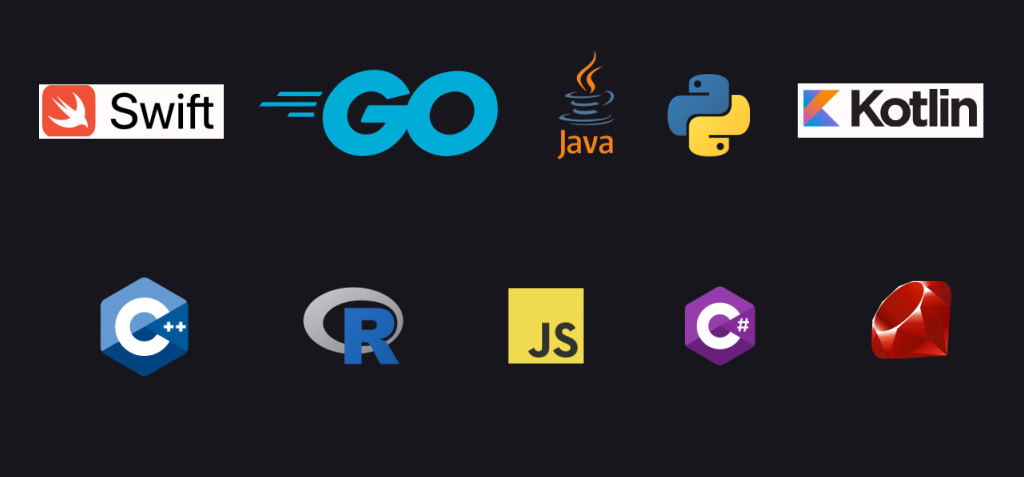Programming Languages to Improve Coding Skills
The Programming Languages to Improve Skills chosen for the TOP list were determined through a thorough examination, considering a range of factors and criteria. We began by analyzing prevailing trends in the industry and assessing market demands to pinpoint languages gaining traction and expected to remain pertinent in 2024.
We are familiar with languages such as Python, SQL (Structured Query Language), and Javascript, but as of 2024, there are numerous alternatives worth exploring. Additionally, mastering multiple programming languages can enhance your employability prospects.
In this blog post, we'll delve into the following topics:
Python
Python Programming Languages to Improve Skills is an excellent choice for individuals looking to dive into the world of coding. Known for its simplicity and readability, Python is widely regarded as one of the most beginner-friendly programming languages. Whether you’re completely new to programming or looking to expand your skill set, Python offers a solid foundation for learning and building upon.

Python’s versatility is another compelling factor for beginners. It can be used for a wide range of applications, including web development, data analysis, machine learning, artificial intelligence, automation, and more. This versatility allows learners to explore various domains and tailor their learning path to suit their interests and career goals.
When it comes to learning Python, there are numerous resources available, from online tutorials and courses to interactive coding platforms and books. Many of these resources cater specifically to beginners, providing step-by-step guidance and hands-on exercises to reinforce learning.
In summary, Python programming offers an accessible entry point into the world of coding, with its simplicity, versatility, and abundance of learning resources making it an ideal choice for beginners. Whether you’re aiming to build practical skills for the workforce or delve into more advanced concepts, Python provides a solid foundation upon which to embark on your coding journey.
Javascript
JavaScript Programming Languages to Improve Skills is a versatile and widely used programming language that powers most of the interactive content you encounter on the web. Learning JavaScript opens up a world of possibilities for creating dynamic websites, web applications, and even mobile apps. Here’s why diving into JavaScript is a rewarding journey for aspiring programmers:

Beginner-Friendly:
JavaScript is known for its beginner-friendly syntax. Its similarity to other programming languages like Java and C makes it easier for newcomers to grasp foundational programming concepts.
Interactive Learning:
One of the best ways to learn JavaScript is by doing. As you progress, you can immediately see the results of your code in action within web browsers, which fosters an interactive and engaging learning experience.
Versatility:
JavaScript isn’t limited to just web development. With frameworks like Node.js, you can use JavaScript to build server-side applications, command-line tools, and even desktop applications.
Abundance of Resources:
There is no shortage of resources available for learning JavaScript. From online tutorials and interactive coding platforms to books and community forums, learners have access to a wealth of materials to support their journey.
Thriving Community:
JavaScript boasts a vibrant and supportive community of developers. Whether you’re seeking advice, troubleshooting code issues, or looking for inspiration, the JavaScript community is there to help.
In-Demand Skill:
Proficiency in JavaScript is highly sought after by employers across industries. Whether you’re aiming for a career in web development, software engineering, or app development, JavaScript skills can significantly enhance your job prospects.
Continuous Evolution:
JavaScript is constantly evolving with new features and updates. By learning JavaScript, you not only gain valuable programming skills but also develop the ability to adapt to changes in the tech landscape.
Transferable Skills:
Many concepts you learn while mastering JavaScript, such as variables, loops, and functions, are transferable to other programming languages. This makes JavaScript a great stepping stone for branching out into other areas of software development.
In summary, learning JavaScript is an excellent investment for aspiring programmers. Its beginner-friendly nature, versatility, abundance of resources, and thriving community make it an exciting language to explore. Whether you’re aiming to build websites, web applications, or delve into other domains of software development, JavaScript provides a solid foundation for your journey.
Java
Java Programming Languages to Improve Skills is an excellent choice for learning the fundamentals of coding and software development. Java is a widely-used, versatile, and powerful programming language that is both beginner-friendly and extensively used in professional settings. Here are some key reasons why Java is a great language for beginners to learn:

Ease of Learning:
Java was designed with simplicity and readability in mind. Its syntax is similar to English, making it easier for beginners to understand and write code. Additionally, Java’s extensive documentation and wealth of online resources make it accessible for self-learning.
Platform Independence:
One of the standout features of Java is its platform independence. Java programs can run on any device that has a Java Virtual Machine (JVM) installed, which means you can write code once and run it anywhere, whether it’s a Windows PC, Mac, Linux machine, or even a smartphone.
Strong Community Support:
Java has a vast and active community of developers worldwide. This means that if you encounter any issues or have questions while learning Java, there are plenty of forums, tutorials, and communities where you can seek help and guidance.
Versatility:
Java is used in a wide range of applications, including web development, mobile app development (Android), enterprise software, scientific computing, and more. By learning Java, you open the door to various career opportunities and fields of interest.
Object-Oriented Programming (OOP):
Java is an object-oriented programming language, which means it emphasizes the concept of objects and classes. Understanding OOP principles is crucial for building scalable and maintainable software, and Java provides an excellent foundation for learning these concepts.
Robust Standard Library:
Java comes with a rich standard library that provides ready-to-use classes and methods for common programming tasks. This saves beginners from having to reinvent the wheel and allows them to focus on learning core programming concepts.
Job Opportunities:
Java developers are in high demand across industries. Whether you’re interested in web development, software engineering, or mobile app development, proficiency in Java can significantly enhance your job prospects.
To start learning Java, you can utilize online tutorials, interactive coding platforms, textbooks, or enroll in courses offered by educational institutions or online learning platforms. As you progress, practice coding regularly, work on projects, and collaborate with other developers to deepen your understanding and proficiency in Java programming.
Kotlin
Kotlin has emerged as a popular programming language for both beginners and seasoned developers alike due to its modern features, concise syntax, and versatility. Learning Kotlin offers numerous benefits for aspiring programmers:

Ease of Learning:
Kotlin’s syntax is concise and intuitive, making it relatively easy for beginners to grasp. Its similarity to languages like Java and Swift also facilitates a smooth transition for those with prior programming experience.
Interoperability:
Kotlin is fully interoperable with Java, allowing developers to leverage existing Java libraries and frameworks seamlessly. This interoperability makes Kotlin a practical choice for Android app development, where Java has traditionally been dominant.
Modern Features:
Kotlin incorporates modern programming concepts such as null safety, higher-order functions, extension functions, and coroutines. These features enhance code readability, maintainability, and developer productivity.
Versatility:
Kotlin is not limited to Android development; it can be used for a wide range of applications, including backend development, web development (with frameworks like Ktor), desktop applications (with frameworks like TornadoFX), and even native iOS development (with Kotlin Multiplatform Mobile).
Official Support:
Kotlin is developed and supported by JetBrains, the company behind popular IDEs like IntelliJ IDEA and Android Studio. This backing ensures regular updates, extensive documentation, and strong community support.
Growing Popularity:
Kotlin’s adoption is steadily increasing across industries, with many tech giants, startups, and open-source projects embracing it for various purposes. Learning Kotlin opens up opportunities for collaboration and employment in a rapidly expanding ecosystem.

Ruby
Ruby programming is an excellent choice for those looking to dive into the world of coding. Known for its elegant syntax and simplicity, Ruby is a dynamic, object-oriented programming language that emphasizes productivity and developer happiness.
One of the key advantages of learning Ruby is its readability. Its syntax is designed to be intuitive and natural, making it easier for beginners to grasp fundamental programming concepts. This readability also fosters a supportive community where developers often share code and collaborate on projects.
C#:
C# is a modern, versatile programming language developed by Microsoft. It’s object-oriented, providing a productive environment for building a wide range of applications. With its extensive framework, C# is commonly used for developing desktop, web, and mobile applications. It offers features like type safety, garbage collection, and LINQ, enhancing developer productivity and code quality.
C:
C is a foundational programming language known for its efficiency and portability. It’s procedural, focusing on sequences of steps to solve problems. Widely used in system programming and embedded systems, C provides low-level access to hardware resources and offers precise control over memory management. Despite its age, C remains crucial for developing operating systems, device drivers, and other performance-critical applications.
C++:
C++ is a powerful, versatile programming language with a rich set of features. Building upon C, it introduces concepts like classes, templates, and inheritance, enabling both procedural and object-oriented programming paradigms. C++ is widely used in software development for its performance and flexibility, especially in areas like game development, system programming, and high-performance computing. Its complexity can be challenging, but mastering C++ unlocks the ability to create efficient and scalable software solutions for various domains.
SQL:
SQL (Structured Query Language) is a standardized language for managing and querying relational databases. It provides a declarative approach to database operations, allowing users to define the desired result without specifying the exact steps to achieve it. SQL is essential for storing, retrieving, updating, and manipulating data in databases of all sizes.
Its simplicity and universality make it a fundamental skill for developers, data analysts, and database administrators across various industries, enabling efficient data management and extraction of valuable insights.
PHP:
PHP is a dynamic scripting language widely used for web development. Designed for server-side scripting, PHP enables the creation of dynamic web pages and web applications with ease. Its flexibility allows integration with various databases and web servers, making it a popular choice for building dynamic websites, content management systems (CMS), and e-commerce platforms.
PHP’s extensive ecosystem of frameworks and libraries simplifies development tasks and accelerates project delivery. While criticized for its inconsistent design and security vulnerabilities, PHP remains a prevalent tool in the web development toolkit, powering a significant portion of the internet’s websites and applications.



























